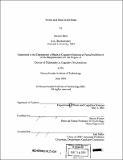Words and rules in the brain
Author(s)
Rhee, Jaemin, 1972-
DownloadFull printable version (17.41Mb)
Other Contributors
Massachusetts Institute of Technology. Dept. of Brain and Cognitive Sciences.
Advisor
Steven Pinker.
Terms of use
Metadata
Show full item recordAbstract
The Words-and-Rules theory (WR) posits that different mental processes underlie regular and irregular past tense formation: regular forms are rule-generated ('add -ed'), whereas irregular forms are retrieved from memory. These mental processes are hypothesized to engage distinct neural mechanisms. The goal of the present thesis was to localize and differentiate the neural substrates of regular and irregular past tense generation. Two neuroimaging techniques, magnetoencephalography (MEG) and functional magnetic resonance imaging (fMRI) were used to test healthy, right-handed subjects who were native speakers of English in a past tense production paradigm, in addition to a lexical access study. The results indicate that there is a dissociation in both the time course of activation and brain areas involved for the regular vs. the irregular past tense formation.
Description
Thesis (Ph. D.)--Massachusetts Institute of Technology, Dept. of Brain and Cognitive Sciences, 2001. Includes bibliographical references (leaves 129-142).
Date issued
2001Department
Massachusetts Institute of Technology. Department of Brain and Cognitive SciencesPublisher
Massachusetts Institute of Technology
Keywords
Brain and Cognitive Sciences.